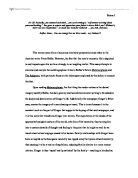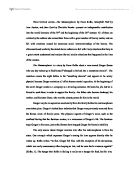The fore-mentioned symbol of the rotten apple is representative also of grotesque, and death – as the charwoman does. In Metamorphosis, Gregor’s room represents confinement, as the misery and depression he is trapped by and feels inside, manifests itself outward in his decline. Like Kafka, Gregor is trapped and consumed by the alienation he is subject to – this contributing to his depression and loss of sense of being. Gregor is shoved into the room that confines him by his father as “from behind his father gave him a strong push which was literally a deliverance and he flew far into the room, bleeding freely.” This language used by Kafka is ironic as Gregor, like Georg in The Judgement, is only truly “free[d]” and “deliver[ed]” by death. Thus the symbolic door that Gregor tries to go through, may actually be seen to represent the door to the ‘other side’, open only when he is dead.
While dealing with symbols, one cannot ignore the most important one; that of Gregor as a bug. Why a bug? The answer is simple, Kafka’s depiction of Gregor as a bug symbolizes alienation – after all, most human beings ignore and loathe insects. Furthermore, in so creating this bug transformation, Kafka implicitly introduces the question of reality vs. illusion as one must indeed note that it is most unlikely that Gregor actually transforms into an insect. It is more likely that Gregor metaphorically becomes a bug – it is illusory, in his mind. Kafka himself is depicted clearly here, as he finds inspiration by “immersing himself totally in his own mental world, trying to describe his dream-like inner life.” The division within Kafka’s world, is a division of the mind itself – Gregor’s condition thus possibly being a physical manifestation of the grotesque realization of hopelessness inside. Kafka seems to have possessed quite an existentialist and nihilistic view. It appears, that evil for Kafka – and by extension, Gregor, found in this hopelessness, is attributable in some way to human consciousness; it is a kind of mistake or failure within the evolutionary process of the mind. The mind seems to be lacking the desire to further evolve, thus accepting as final, as real, its knowledge of the world. Faced with this, it is no wonder Gregor fell into a state of hopelessness and despair, thus leading to his decline.
Evidently, Kafka was quite a philosopher, and his views surface in his works. His literary efforts in fact, were oft described as psychoanalytic writing – in short, Kafka used writing as a form of catharsis; ‘self torture to bring about personal healing’. It is held that Kafka reached the conclusion ahead of Freud that the “origin of neurosis lies in a son’s relationship to his father.” Kafka wrote a ‘letter’ to his dad – a small masterpiece of psychoanalytic writing which he never delivered. In this letter, Kafka describes his writing as a psychoanalytic cure, stating that it is “a long-drawn-out leave-taking from you’ and again that ‘my [his] writing was all about you [his father].” The copies of his work he sent to his father were ‘greeted’ with indifference. However, this did not diminish Kafka, but rather, it is my view it may have even assisted him in his aspirations of feeling free. Perhaps Kafka found a sense of hope in hopelessness, he knows his father will be indifferent, but hopes maybe this time he won’t be; at the same time hoping he will be – as otherwise would throw everything out of perspective. Without need for catharsis, why would he write?
It can therefore be argued that the division within Kafka’s and Gregor’s worlds is a division of the mind itself and that Kafka’s writing and imagination conceives symbolic stories of man’s deprived spiritual state. Existentialist thoughts plagued Kafka, and in his writing to Max Brod concerning his desire for “freedom, freedom above all else,” he goes on in characteristically ambiguous terms: “[speaking of the Tubercolosis disease which overcame him] Admittedly the wound is still here, of which my sick lung is only the symbol.” The question to be asked is where is this ‘here’, perhaps it is found in life itself, “where the nameable diseases that kill us are only symbols of an inescapable, inscrutable decree that all men must die.”
What of Kafka’s views on religion? After all he was Jewish living in a place under German influence, and under the oppressive rigor of his dad. Notably, religion plays a role in The Judgement, in fact, the story itself is a kind of parable as it can be interpreted in many ways. Judgement takes on the quality of a myth, possibly communicating Kafka’s understanding of human existence and the central place that being brought to judgment occupies in our lives. Human beings cannot rightfully make judgments about human affairs, as, to be in a position to judge, one must be standing outside the situation. Yet, being outside means one is in no position to make judgment. Kafka shares with some Jewish thinkers in this manner of thinking, though this seems to be something that both Jews and Christians seem to be unready to recognize. To describe Kafka’s perception as Jewish or central European would be too easy as it appears that one cannot certainly state that he neither believed in God in Christian nor even in the Mosaic terms of his Jewish tradition. One may argue however, that the divine justice and righteousness by which believers see as the ultimate measure by which all lives are judged is indeed active in Kafka’s thinking. The significance of final judgment and the dire responsibility it creates, is present in the ending of Judgment. The affirmation of love as Georg falls to his death can be seen as a hint of redemption – of resurrection, in the acceptance of his father’s verdict. This seems a biblical allusion as it brings to mind the sacrifice of the life of Jesus Christ, executing the will of His Father.
In his writing of The Judgment, Kafka employs another noteworthy technique, that of the epistolary. Kafka seems very aware of the connection between the act of writing and of the “tropic of absence, a tropic … key to his own literary solitude” <http://www.kafka.org/essays/koopmanWB.htm>. Colin Koopman suggests that the “letters between Georg’s friend (who perhaps only exists as an epistolary relay) and his father are the point around which the text, and thus Georg’s existence, pivots” <http://www.kafka.org/essays/koopmanWB.htm>. Koopman goes on to further view that “it is only because the father possesses such an epistolary advantage that Georg obeys his commandment to commit suicide. He lays down and dies … suffering his own linguistic originality.” Georg’s father denies him his epistolary relief, a relief that is described as “[containing] within it the practical absence required by the linguistic and existential solitude that Kafka is concerned to break free from” <http://www.kafka.org/essays/koopmanWB.htm>. Georg’s father breaks his son’s will to write as Kafka’s father attempts to do with his disdain for and indifference towards it.
In conclusion, although Kafka desired his writing to be a semantic and psychological mechanism where the author is ‘distanced’ from the “act of reading or interpretation” <http://www.kafka.org/essays/koopmanWB.htm>, and although he indeed achieves the possibility of their being read originally due to the use of his parable technique, one cannot help but to notice the critical impact his own life makes in the analysis of his texts Metamorphosis and The Judgment. His nihilistic and existentialistic stance lends strongly to his works, suggesting that the value judgments which we hold dear are nothing more than our own perspective on reality. None are absolute, implying that in the end – none are really to be taken seriously. However, although the reality of the situations Kafka creates for his characters is questionable, the intense moral seriousness with which he writes is not. The situations may be a ‘laughing matter’ but the way Kafka tells it (utilizing techniques such as clear imagery, symbolism, metaphor and allusion, just to name a few), is certainly serious and perhaps even terrifying. These techniques portray transformation and decline at the hands of a harsh experience with both Kafka’s and his characters’ fathers, family and society at a whole – serving to drive them to the state where they lose their humanity (Gregor’s transformation into an insect, and Georg’s suicide). Kafka is definitely clear in his writing, with his attempts to cleanse himself of his pain, like Georg achieved by jumping into the river. Though he doesn’t commit suicide, Kafka too is condemned to emotional ‘death’ by his father, and his ‘jump’ is his writing. With this in mind, Kafka definitely can be seen as ‘fictionalizing’ his own experience.
Works Cited
Kafka: A Study. Life & Work. E25N folder notes p. 11-13
Koopman, Colin. Kafka: Writing to Become. The Kafka Project. 5th September 2004.
<http://www.kafka.org/essays/koopmanWB.htm>
Bibliography
Kafka, Franz. Metamorphosis and other stories, tr. E. and W. Muir, 1961 (Penguin)
Kafka: A Study. Life & Work. E25N folder notes, p. 12
Kafka: A Study. Life & Work. E25N folder notes, p. 11
Kafka: A Study. Life & Work. E25N folder notes p. 13







